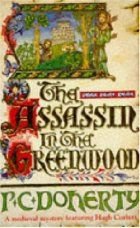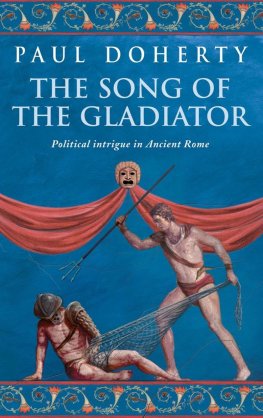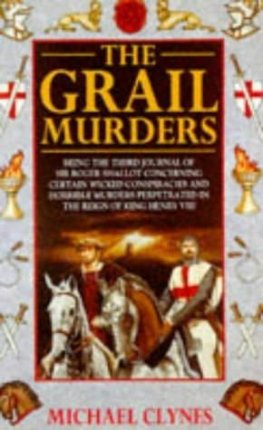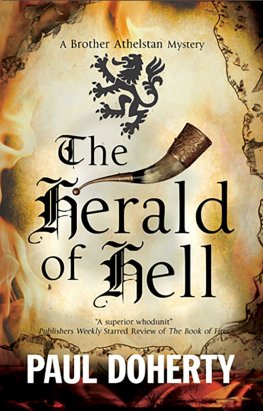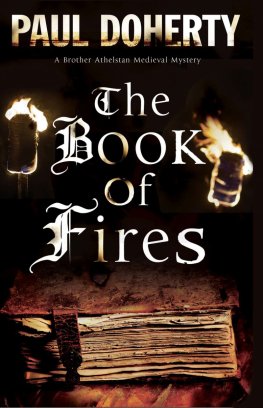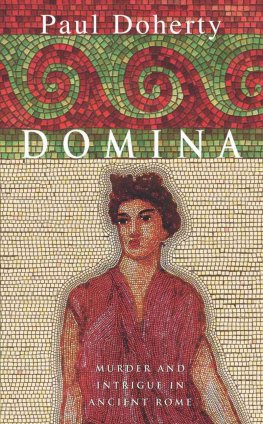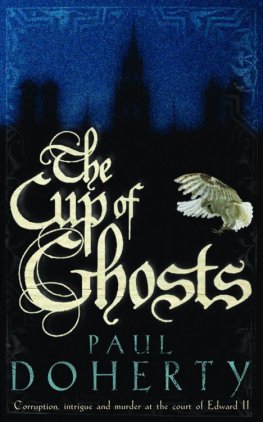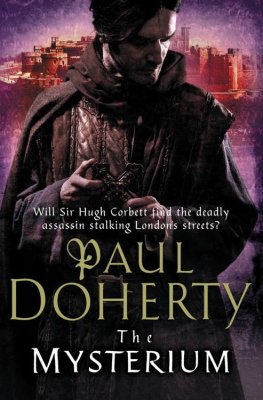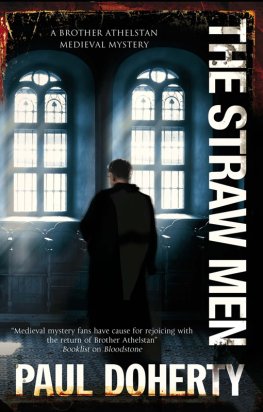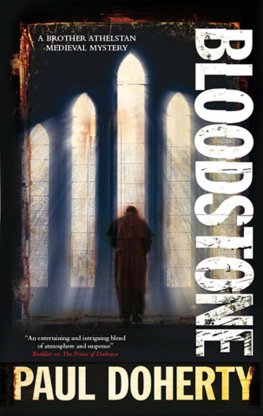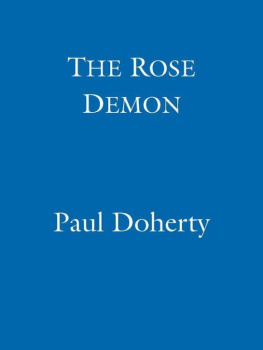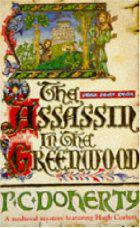Paul Doherty - Assassin in the Greenwood
Here you can read online Paul Doherty - Assassin in the Greenwood full text of the book (entire story) in english for free. Download pdf and epub, get meaning, cover and reviews about this ebook. genre: Detective and thriller. Description of the work, (preface) as well as reviews are available. Best literature library LitArk.com created for fans of good reading and offers a wide selection of genres:
Romance novel
Science fiction
Adventure
Detective
Science
History
Home and family
Prose
Art
Politics
Computer
Non-fiction
Religion
Business
Children
Humor
Choose a favorite category and find really read worthwhile books. Enjoy immersion in the world of imagination, feel the emotions of the characters or learn something new for yourself, make an fascinating discovery.
- Book:Assassin in the Greenwood
- Author:
- Genre:
- Rating:5 / 5
- Favourites:Add to favourites
- Your mark:
- 100
- 1
- 2
- 3
- 4
- 5
Assassin in the Greenwood: summary, description and annotation
We offer to read an annotation, description, summary or preface (depends on what the author of the book "Assassin in the Greenwood" wrote himself). If you haven't found the necessary information about the book — write in the comments, we will try to find it.
Assassin in the Greenwood — read online for free the complete book (whole text) full work
Below is the text of the book, divided by pages. System saving the place of the last page read, allows you to conveniently read the book "Assassin in the Greenwood" online for free, without having to search again every time where you left off. Put a bookmark, and you can go to the page where you finished reading at any time.
Font size:
Interval:
Bookmark:
Paul Doherty
Assassin in the Greenwood
Prologue
In his cold, cramped cell in the monastery outside Worcester, Florence the chronicler lifted his milky, dim eyes and stared out at the darkness beyond his cell window. How should he describe these times? Should he recount all that he had heard? Was it true for instance that Satan himself, the prince of darkness, had risen from the depths of hell with his horde of black-garbed legions to tempt and terrorise the human soul with visions from the pit? He had been told that an evil sea of demons, rumbling and boiling over the face of the earth, amused themselves disguised as snakes, fierce animals, monsters with crooked limbs, mangy beasts and crawling things. At midnight, so Florence had heard, the heavens rumbled with thunder and lightning flashed above a restless sea of heads, hands outstretched, eyes glassy with despair.
Another monk, a member of his community, claimed to have seen a chariot speed through the sky pulled by stallions with fiery eyes and fetid breath; inside a grinning skeleton wearing a crown of brambles.
It was a time of killing. Great Edward was in Scotland hunting down the rebel leader Wallace while in France, the silver-haired Capetian, Philip le Bel, plotted in his secret chambers beneath the Louvre Palace. He was gathering his armies, thronging the roads of Normandy with lines of men moving snakelike, cavalry, men-at-arms, archers and spearmen, pouring north to throng on France's northern borders where they waited for the order to cross into and destroy the Kingdom of Flanders.
Florence had heard such mutterings in the refectory as Father Abbot entertained royal messengers, dusty and dark-eyed, who rode from the coast. These couriers kept the King's generals in London informed of French ships in the Narrow Seas for had not Edward prophesied that when the French fleet sailed, Philip would deliver his hammer blows against Flanders and perhaps against England's southern coast?
In which direction would Philip's armies march first? The pope in Avignon crouched behind his throne and waited. Edward of England tossed restlessly in his soldier's bed as his mind worried at the problem. The merchants in London also waited; if Philip conquered Flanders then England's trade, the shiploads of wool sent to the looms and weavers of Ghent and Bruges, would stop summarily and fortunes would be lost. All of Europe held its breath. Chroniclers like Florence could only dip their quills and pen the direst warnings and prophecies of what might come to pass.
In the dark streets and alleyways of Paris, which ran together in a spider's web on the far side of the Grand Pont, more practical men laid their schemes and drew up plans to discover Philip's true intentions. Sir Hugh Corbett, Edward I of England's most senior clerk in the chancery, master of the King's secrets and Keeper of the Secret Seal, had flooded the French city with his agents: merchants ostensibly looking for new markets; monks and friars supposedly visiting their mother houses; scholars hoping to dispute in the schools; pilgrims apparently on their way to worship the severed head of St Denis; even courtesans who hired chambers and entertained clients, the clerks and officials of Philip's secret chancery. Their task was dangerous for William of Nogaret, Corbett's rival at the French court, together with Philip's master spy, Amaury de Craon, waged a silent but bloody war against Corbett's legions of spies. Two English clerks had already disappeared, their disfigured corpses later washed up on the muddy banks of the Seine. Another three of Corbett's 'pilgrims' were now rotting cadavers on the great scaffold at Montfaucon. A comely courtesan, young Alisia, with silken skin and a tangle of corn-gold hair, had been brutally beaten to death in her chamber at The Silver Moon where so many of the French King's chancery clerks were accustomed to sup and drink.
So the bloody chess game was played: pawn against pawn, knight against knight. Knowledge was the prize at stake. When would Philip give the orders to march? Where would his troops attack in Flanders? If Philip kept the advantage of surprise then all would be well, but if Edward of England got to know then so would his Flemish allies who would mass their forces against Philip's advance.
Publicly, however, Edward and Philip were the best of friends the closest of allies even. Edward had married Philip's silver-haired sister Margaret whilst his own son, the Prince of Wales, was to be betrothed to Isabella, Philip's one and only daughter. The French sent Edward a pair of costly silken gloves with jewels crusted around the cuff. Edward responded with a Book of Hours, each page a glorious tapestry of colour. Philip called Edward 'his dear coz'. Edward replied, sending tender greetings to 'his dear brother in Christ'. Yet in the alleyways and musty taverns, each King waged a silent war.
In The Fleur de Lys tavern which stood on the corner of Rue des Capucines, Ranulf-atte-Newgate, Corbett's manservant and ostensibly Edward's unofficial envoy to the French court, sat in the corner of the taproom with Bardolph Rushgate. A young man of indeterminate parentage and mysterious past, Bardolph, despite his boyish features and golden love-locks, was a perpetual English student, financed by the English Exchequer to visit this university or that. He was instructed not to take any degree or study the mysteries of the Quadrivium but to collect information on behalf of his masters at home. Now he leaned back against the wall, eyes closed, pretending to be much the worse for drink. Ranulf, too, acted as if in his cups, his red hair tousled, eyes half-closed, mouth slack. He had even rubbed some chalk into his white face to make himself look more pallid. To all outward appearances they were two Englishmen who found the strong wines of Paris too rich to stomach.
'Do you think the wench can cope?' Bardolph muttered.
'I hope so.'
'How many are there now?'
Ranulf looked through the fug of the noisy tavern and studied the group of relic-sellers. They seemed more interested in staring back than in selling any of the trinkets from their trays which now lay stacked on the floor beside them.
'How many?' Bardolph repeated. 'Six,' Ranulf replied.
His stomach churned as his hand went beneath the table, seeking reassurance from the thin, stabbing Welsh dagger stuck into his belt and the dirk at the top of his long riding boots. Once again Ranulf felt his leather sack containing a small crossbow and a sheath of bolts.
Above them, in one of the narrow closets which the landlord grandly described as 'a chamber', Clothilde, a buxom wench with skin as dark and smooth as a grape, was earning her silver. She bounced across the battered old four-poster bed, her legs and arms wrapped round Henri de Savigny, a cipher clerk from Philip's chancery. Ranulf had been playing him for days. The French clerk, as lecherous as any dog on heat, couldn't believe his luck at finally being favoured by such a high-class courtesan when at first she had refused him. No fool, however, Henri knew the price she asked: a copy of the cipher Philip had sent to his generals on the borders of France.
At first the clerk had refused. He even protested that he would go to Nogaret and reveal all. Bardolph Rushgate had countered that. Wouldn't the very confession be a partial admission of guilt? De Savigny had licked his thick red lips, peered once more at Clothilde's luscious bosom and reluctantly agreed in exchange for a bag of coins and Clothilde's favours free of charge. And what was the point in refusal? Henri had seen the ciphers, which had meant little to him, so how would any English Goddamn understand them? Now he was lost in his own spiral of pleasure, hands running up and down Clothilde's smooth back. He revelled in the way she thrust back her head and her jet black hair swung like some halo of passion around her, whispering and pleading that he do more.
Font size:
Interval:
Bookmark:
Similar books «Assassin in the Greenwood»
Look at similar books to Assassin in the Greenwood. We have selected literature similar in name and meaning in the hope of providing readers with more options to find new, interesting, not yet read works.
Discussion, reviews of the book Assassin in the Greenwood and just readers' own opinions. Leave your comments, write what you think about the work, its meaning or the main characters. Specify what exactly you liked and what you didn't like, and why you think so.

